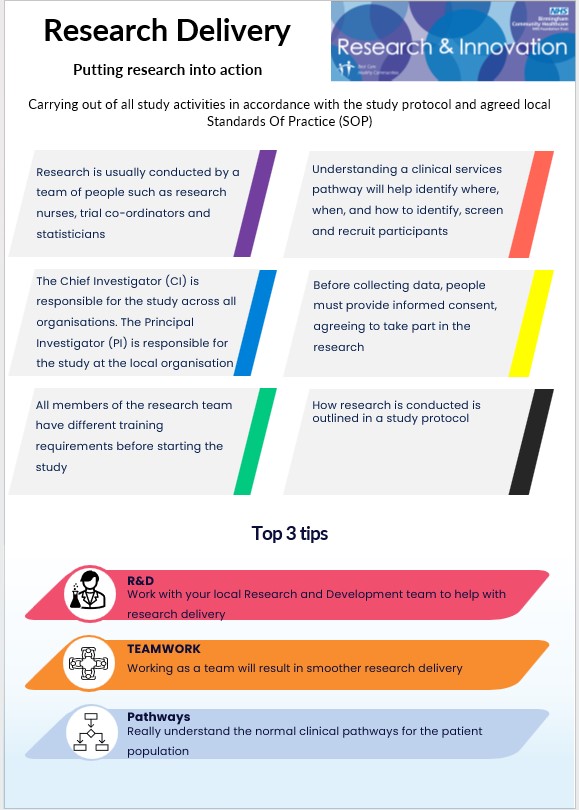Research Delivery is the carrying out of all study activities in accordance with the study protocol and agreed local Standards Of Practice (SOP)
RESEARCH STAFF RESPONSIBILITIES
Chief Investigator (CI)
- Has overall responsibility for the study at sponsor level, they liaise with the PI (see below)
Principal Investigator (PI) – At site level such as BCHC
- Organise and sign off the delegation log (This is a record of all staff involved in the study and their designated roles and responsibilities, also the dates they are authorised to work on the study. The PI needs to countersign each entry.
- Ensures all staff working on the study have been appropriately trained
- The implementation of study amendments
- Responsibility for the maintenance of the Site File, Screening Log, Source data form
- Reporting of Adverse Events (AE)
- To keep a version control log, and to ensure only the most up to date documents are in use
- The secure transfer of data
- The appropriate delegation of study activities
- Ensure the eligibility of all participants recruited to the study
- Recruit to time and target
Research Staff
- To work within the protocol and local SOP guidance as authorised by the delegation log
- To adhere to the standards of Good Clinical Practice (GCP)
- To keep research data secure
1. RESEARCH COMPONENTS
You will need to break the project down into its separate components, detailed here, as you may not be involved in all aspects of the total project
2. ADVERTISING
How will you promote the project. Consider; Service Leads/Patient Info Leaflets/Social media/Newsletters/Posters/
3. SCREENING
The process of looking for potential recruits. In relation to the inclusion/exclusion criteria This active looking for participants will need to be recorded accurately and timely in the Screening log
4. CONSENT TO CONTACT
This is the process where a Clinician for example would introduce a study to a Patient and seek permission (usually written) for the Study Team to contact the potential participant
5. CONSENT
Informed Consent: A formal process where the potential Participant is given all the information about the study and it’s requirements in a way the Participant can understand. The Participant completes a consent form, which is initialled, signed and dated.
Consent can be withdrawn at any time
6. RECRUITMENT
List Names, contact numbers/ addresses of the Recruiters on recruitment materials. Keep to recruitment time and target.
7. RANDOMISATION
Sometimes a study may require allocating participants to different pathways within the same study. They will be allocated randomly as defined in the protocol
8. DATA COLLECTION
The accurateand timely recording of study data, whether paper or electronic.
Usually anonymised Transferred securely using the defined processes in the protocol or local SOP Stored securely with restricted access
9. ONGOING STUDY MANAGEMENT/
ADMINISTRATION
Implementation of amendments and updates Responsibility for the maintenance of the Site File, Screening Log, Source data form. Reporting of Adverse events. To keep a version control log, Ensure only the most up to date documents are in use.
The secure transfer of data. Guidance: https://www.gla.ac.uk/media/Media_359359_smxx.pdf
Keeping track of the participants and arranging the follow up appointments
10. INITIAL/BASELINE APPOINTMENT
First appointment with participant. Consent is often obtained during this time.
11. FOLLOW UP
Follow Up appointments at specified
points. Secure transfer of data at these points
12. CLOSE DOWN & ARCHIVING
The process of ending all Study Activity. Liaise with Sponsor for close down process. PI to complete and sign off the delegation log. Removal of any advertising materials. Reimbursements are all processed. The secure transfer and storage of study data. Data reconcilliation. Site File reconcilliation
Identify who will involved in each part of the process
All research staff who have any access or activity to the Research Project must be entered onto the Delegation Log
Is this part of business as usual or will research activity need additional resources?
Local SOPS may be required to explain how the protocol will be implemented at BCHC (giving the detail of how it should be done )
NB These should be approved / discussed with the Sponsor/R&I)
Points to consider for each component
Permissions and Access to:
Medical Records e.g. RIO
Databases & platforms
Site File – electronic
FINANCE /FUNDING/INCENTIVES
Study Sponsor to provide funding or
R&I
Vouchers or cash payments to
participants required
Are external/ resources/ organisations required
Pharmacy
Laboratory
Couriers
Bank Staff
Employ Study Staff
Consider financial implications
STAFF
The appropriate delegation of study
Activities
Access eg RIO
DBS
Investigator CV. See link for template
TRAINING
Good Clinical Practice training
Study specific training
Additional clinical skills training
Data handling
https://bchceducation.co.uk/
PARTICIPANT FEDBACK
PRES
https://www.nihr.ac.uk/documents/participant-in-research-experience-survey-pres-202122/31768
DATA TRANSFER
Secure Methodsof transfer
Paper copies -secure storage
SAMPLE TRANSFER
- Couriers
- Laboratory requirements
- Postage
- Stamps
SUPPORT AND GUIDANCE
PI support from R&I
COMMUNICATION
Study may need a website or e-mail account set up
Mailing lists
Dissemination of findings
Meetings
Newsletters
Amendments
EQUIPMENT
Clinical for samples
Sample storage/fridge/freezer
IT related- iPads/laptops/internet availability
Storage space
Clinical and general waste disposal
VENUE
Clinic or other eg. school
Storage for study documents
Study equipment storage
Clinical waste
ONGOINGMANAGEMENT OFSITE FILE
Electronic, paper or a combination.
Keeping file up-to-date.
Stored securely with restricted access.
Study documents to be localised to BCHC.
 Click Here To Download
Click Here To Download